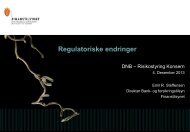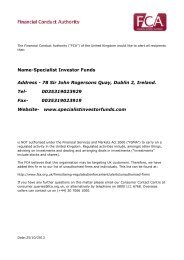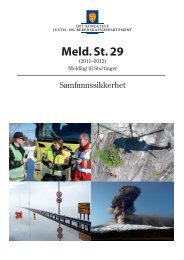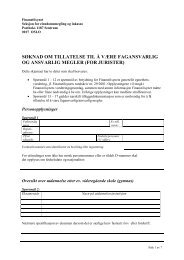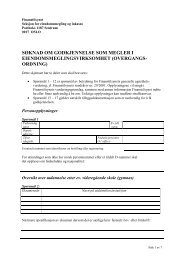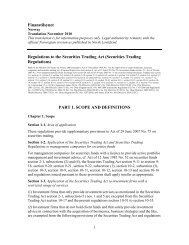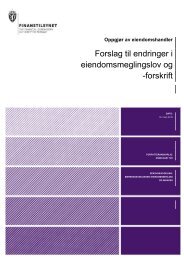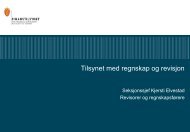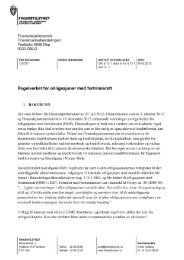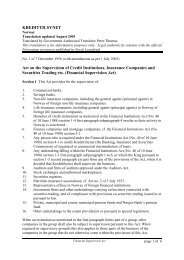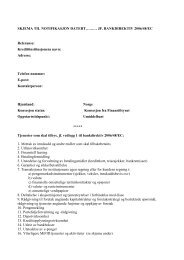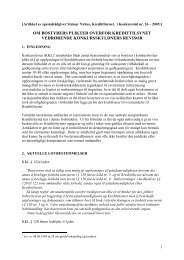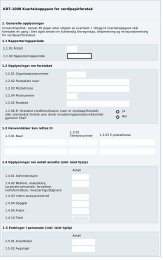Rapport om gjennomføring av AIFMD i norsk rett - Finanstilsynet
Rapport om gjennomføring av AIFMD i norsk rett - Finanstilsynet
Rapport om gjennomføring av AIFMD i norsk rett - Finanstilsynet
You also want an ePaper? Increase the reach of your titles
YUMPU automatically turns print PDFs into web optimized ePapers that Google loves.
EN<br />
L 174/24 Official Journal of the European Union 1.7.2011<br />
Article 13<br />
Remuneration<br />
1. Member States shall require AIFMs to h<strong>av</strong>e remuneration<br />
policies and practices for those categories of staff, including<br />
senior management, risk takers, control functions, and any<br />
employees receiving total remuneration that takes them into<br />
the same remuneration bracket as senior management and<br />
risk takers, whose professional activities h<strong>av</strong>e a material<br />
impact on the risk profiles of the AIFMs or of the AIFs they<br />
manage, that are consistent with and pr<strong>om</strong>ote sound and<br />
effective risk management and do not encourage risk-taking<br />
which is inconsistent with the risk profiles, rules or instruments<br />
of incorporation of the AIFs they manage.<br />
The AIFMs shall determine the remuneration policies and<br />
practices in accordance with Annex II.<br />
2. ESMA shall ensure the existence of guidelines on sound<br />
remuneration policies which c<strong>om</strong>ply with Annex II. The<br />
guidelines shall take into account the principles on sound<br />
remuneration policies set out in Rec<strong>om</strong>mendation<br />
2009/384/EC, the size of the AIFMs and the size of AIFs they<br />
manage, their internal organisation and the nature, the scope<br />
and the c<strong>om</strong>plexity of their activities. ESMA shall cooperate<br />
closely with the European Supervisory Authority (European<br />
Banking Authority) (EBA).<br />
Article 14<br />
Conflicts of interest<br />
1. Member States shall require AIFMs to take all reasonable<br />
steps to identify conflicts of interest that arise in the course of<br />
managing AIFs between:<br />
(a) the AIFM, including its managers, employees or any person<br />
directly or indirectly linked to the AIFM by control, and the<br />
AIF managed by the AIFM or the investors in that AIF;<br />
(b) the AIF or the investors in that AIF, and another AIF or the<br />
investors in that AIF;<br />
(c) the AIF or the investors in that AIF, and another client of<br />
the AIFM;<br />
(d) the AIF or the investors in that AIF, and a UCITS managed<br />
by the AIFM or the investors in that UCITS; or<br />
(e) two clients of the AIFM.<br />
AIFMs shall maintain and operate effective organisational and<br />
administrative arrangements with a view to taking all reasonable<br />
steps designed to identify, prevent, manage and monitor<br />
conflicts of interest in order to prevent them fr<strong>om</strong> adversely<br />
affecting the interests of the AIFs and their investors.<br />
AIFMs shall segregate, within their own operating environment,<br />
tasks and responsibilities which may be regarded as inc<strong>om</strong>patible<br />
with each other or which may potentially generate<br />
systematic conflicts of interest. AIFMs shall assess whether<br />
their operating conditions may involve any other material<br />
conflicts of interest and disclose them to the investors of the<br />
AIFs.<br />
2. Where organisational arrangements made by the AIFM to<br />
identify, prevent, manage and monitor conflicts of interest are<br />
not sufficient to ensure, with reasonable confidence, that risks<br />
of damage to investors’ interests will be prevented, the AIFM<br />
shall clearly disclose the general nature or sources of conflicts of<br />
interest to the investors before undertaking business on their<br />
behalf, and develop appropriate policies and procedures.<br />
3. Where the AIFM on behalf of an AIF uses the services of a<br />
prime broker, the terms shall be set out in a written contract. In<br />
particular any possibility of transfer and reuse of AIF assets shall<br />
be provided for in that contract and shall c<strong>om</strong>ply with the AIF<br />
rules or instruments of incorporation. The contract shall<br />
provide that the depositary be informed of the contract.<br />
AIFMs shall exercise due skill, care and diligence in the selection<br />
and appointment of prime brokers with wh<strong>om</strong> a contract is to<br />
be concluded.<br />
4. The C<strong>om</strong>mission shall adopt, by means of delegated acts<br />
in accordance with Article 56 and subject to the conditions of<br />
Articles 57 and 58, measures specifying:<br />
(a) the types of conflicts of interest as referred to in<br />
paragraph 1;<br />
(b) the reasonable steps AIFMs are expected to take in terms of<br />
structures and organisational and administrative procedures<br />
in order to identify, prevent, manage, monitor and disclose<br />
conflicts of interest.<br />
1.<br />
Article 15<br />
Risk management<br />
AIFMs shall functionally and hierarchically separate the<br />
functions of risk management fr<strong>om</strong> the operating units,<br />
including fr<strong>om</strong> the functions of portfolio management.<br />
The functional and hierarchical separation of the functions of<br />
risk management in accordance with the first subparagraph<br />
shall be reviewed by the c<strong>om</strong>petent authorities of the h<strong>om</strong>e<br />
Member State of the AIFM in accordance with the principle<br />
of proportionality, on the understanding that the AIFM shall,<br />
in any event, be able to demonstrate that specific safeguards<br />
against conflicts of interest allow for the independent<br />
performance of risk management activities and that the risk<br />
management process satisfies the requirements of this Article<br />
and is consistently effective.



